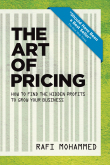How Your Sales Force Can Fight for Maximum Profit
Reprinted from the Harvard Business Review website.
In their hit book Freakonomics, Steven Levitt and Stephen Dubner posit that real estate agents don't have the incentive to push for the highest sales price for homeowners. On the sale of a $300,000 house, for instance, after splitting commissions with their agency as well as the buyer's agent, a selling agent pockets 1.5% of the selling price ($4,500). Selling agents have little reason to hold out for the best price, say $320,000, because their incremental commission is minimal—an extra $300. This results in complacency—it's best to take the sure sale at 300K and run. Levitt and Dubner bolster their claim by citing research that reveals when realtors sell their own homes, they remain on the market one week longer and sell for 3% more.
Sharing upside, however, can change these dynamics. If homes comparable to yours are selling for $300,000, offer the realtor upside to work harder. "If you get 320K, I'll highly recommend you to two friends who will be selling their houses, or I'll pay a bonus." Presto: now the agent's interests are aligned with yours.
Businesses face a similar type of complacency. Like real estate agents, most sales people are paid straight commission on revenue. And like real estate agents, this results in a hesitancy to push for the highest profit. On a client interview many years ago, one sales person was blunt about the side effects of this type of compensation plan. "It's simple," he told me. "We get paid on revenue, so we don't care about profit."
So how can you align incentives so your sales force pushes for the highest profit on each sale? Share information, base compensation on profit, and reward those who push the hardest.
Share information: One of my most memorable pricing interviews was for my first book, The Art of Pricing, with Lloyd Hansen, who at the time was Vice President of Revenue Management for Ford. Lloyd relayed the fascinating upside of sharing Ford's "yellow card" with its sales force. This once-secret card detailed the variable profit that Ford made on each vehicle in its lineup. The sales force was shocked to learn that Mustangs were 10 times more profitable than Probes, the sporty coupe which they'd been spending a disproportionate amount of time selling.
Armed with this information, things changed. First, morale increased. The sales force appreciated the trust the company showed them by sharing such sensitive information. As a result, they focused on making sales that increased profits. Prior to sharing the yellow card, Mustang sales were so slow that the production line was shut down one week per month. Shortly after learning about its high profitability, production of the Mustang raced to maximum overtime, while Probe sales dropped.
Base compensation on profit: When companies shift from revenue-based commissions to profit-based commissions, salespeople prosper only when the company does too. Focusing on profit also curbs unnecessary discounting. While "10% off" may have been the negotiation starter, now the discount-dispenser appropriately feels the pain of this tactic. Even better, consider setting commission tiers. Once transaction profitability exceeds a target level, for instance, offer a 50% bonus. This raises the payoff for pushing for even more profit. Even if you insist on basing compensation on revenue, commission tiers based on price provide incentives to spend those critical extra 30 minutes explaining a product's value-adding attributes.
Finally, reward those who push for the highest profit —even if they are unsuccessful. Opportunities such as "first rights" on new sales leads should be regularly awarded to those who pushed the hardest. To be clear, deciding who to honor shouldn't be based on a numbers-oriented metric. Instead, management should highlight actions that it wants to impress as exemplary to the sales team. So why reward failure? The risk taken on behalf of the company—which the sales person lost a potential commission from—should be acknowledged and encouraged.
Sure, redesigning a compensation plan requires an investment of resources and change is always a challenge. But what's the value of having the people in your company who are recommending products and setting prices focused on generating the highest profit? Priceless...
So why do most companies base sales compensation on revenue instead of what matters most, profit? Does this dampen the incentive to push for high profits? Could these strategies increase your profits?




